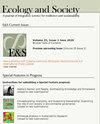Mai Ka Pō Mai: applying Indigenous cosmology and worldview to empower and transform a management plan for Papahānaumokuākea Marine National Monument
IF 3.2
2区 社会学
Q1 ECOLOGY
引用次数: 0
Abstract
Environmental conservation management planning has an important role in creating conditions for social learning, adaptive governance, and improvements for co-management arrangements with Indigenous peoples. Incorporating Indigenous cosmologies, worldviews, and epistemologies within management planning processes can enable factors that support appropriate management practices for protected areas considered to be sacred natural sites by Indigenous peoples. Here, we review processes and outcomes of management planning led by Native Hawaiians with various positionalities that resulted in the Mai Ka Pō Mai Native Hawaiian Guidance Document for the Management of the Papahānaumokuākea Marine National Monument. As we look back to look forward, we highlight the factors that supported knowledge co-production and expanded opportunities to develop management planning and evaluation processes informed by Hawaiian place-based knowledge and human-nature relations of care and reciprocity. These include collaborative approaches, long-term commitment to community and institution capacity-building; an enabling policy environment; and diverse and consistent involvement of Native Hawaiians.Mai Ka pgi Mai:运用土著宇宙观和世界观来授权和改变Papahānaumokuākea海洋国家纪念碑的管理计划
环境保护管理规划在为社会学习、适应性治理和改善与土著人民的共同管理安排创造条件方面具有重要作用。在管理规划过程中纳入土著的宇宙观、世界观和认识论,可以支持土著人民认为是神圣自然遗产地的保护区的适当管理实践。在这里,我们回顾了由不同职位的夏威夷原住民领导的管理规划的过程和结果,这些规划最终形成了《Papahānaumokuākea海洋国家纪念碑管理的夏威夷原住民指导文件》。回顾过去,展望未来,我们强调了支持知识合作生产的因素,并扩大了发展管理规划和评估过程的机会,这些规划和评估过程以夏威夷的地方知识和关怀与互惠的人与自然关系为基础。其中包括合作方法、对社区和机构能力建设的长期承诺;有利的政策环境;以及夏威夷原住民多样化和持续的参与。
本文章由计算机程序翻译,如有差异,请以英文原文为准。
求助全文
约1分钟内获得全文
求助全文
来源期刊

Ecology and Society
环境科学-生态学
CiteScore
6.20
自引率
4.90%
发文量
109
审稿时长
3 months
期刊介绍:
Ecology and Society is an electronic, peer-reviewed, multi-disciplinary journal devoted to the rapid dissemination of current research. Manuscript submission, peer review, and publication are all handled on the Internet. Software developed for the journal automates all clerical steps during peer review, facilitates a double-blind peer review process, and allows authors and editors to follow the progress of peer review on the Internet. As articles are accepted, they are published in an "Issue in Progress." At four month intervals the Issue-in-Progress is declared a New Issue, and subscribers receive the Table of Contents of the issue via email. Our turn-around time (submission to publication) averages around 350 days.
We encourage publication of special features. Special features are comprised of a set of manuscripts that address a single theme, and include an introductory and summary manuscript. The individual contributions are published in regular issues, and the special feature manuscripts are linked through a table of contents and announced on the journal''s main page.
The journal seeks papers that are novel, integrative and written in a way that is accessible to a wide audience that includes an array of disciplines from the natural sciences, social sciences, and the humanities concerned with the relationship between society and the life-supporting ecosystems on which human wellbeing ultimately depends.
 求助内容:
求助内容: 应助结果提醒方式:
应助结果提醒方式:


